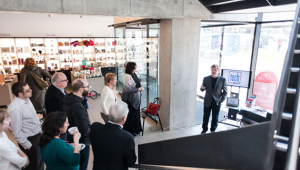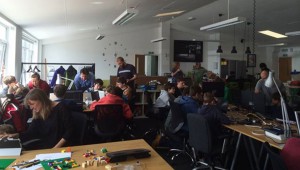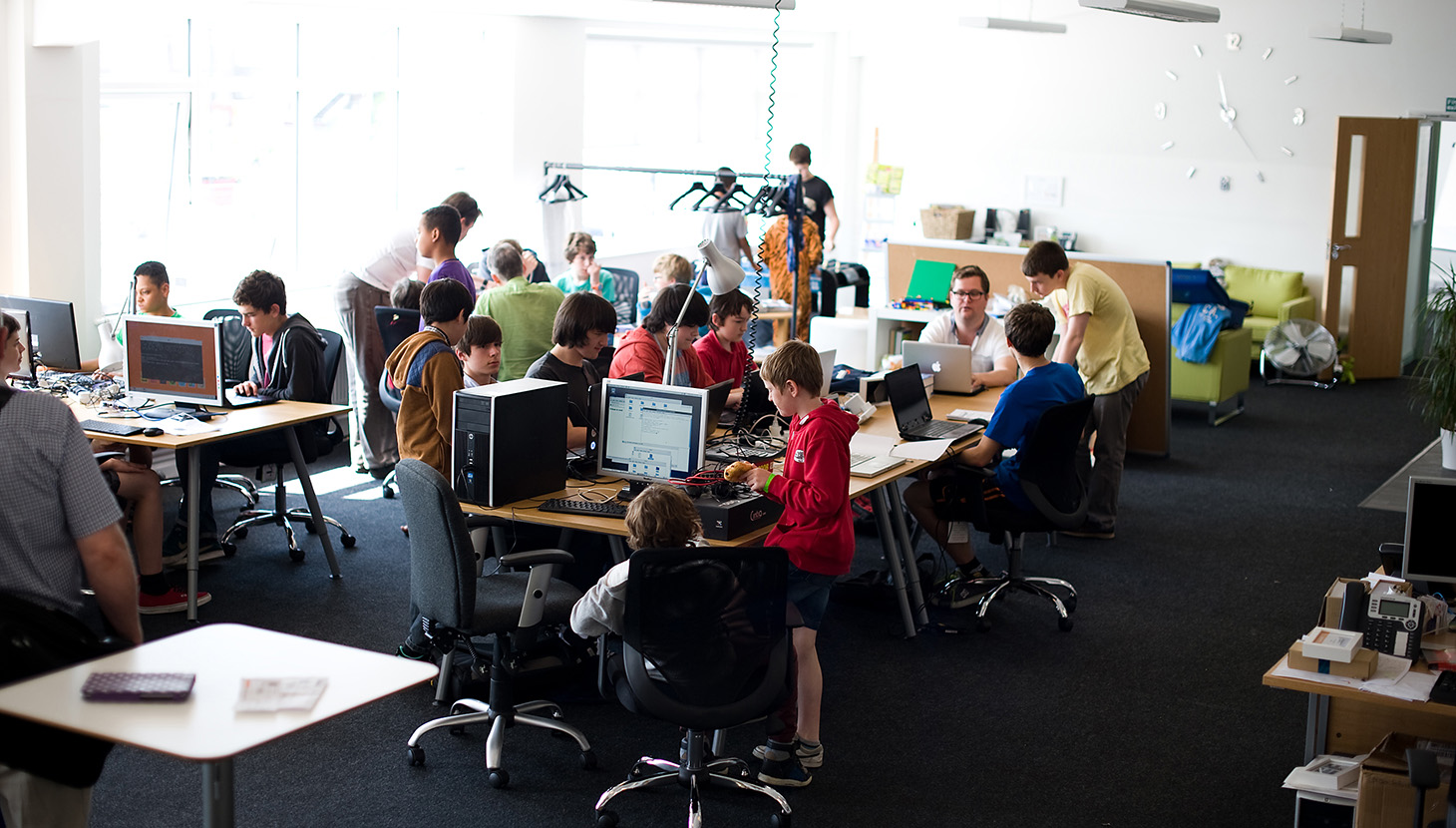Can digital infrastructures enable new forms of collaboration and participation beyond large cities? Shane Mitchell AoU explores the potential for digital clusters to emerge in peri-urban areas and smaller towns and communities.
Oculus Rift, Raspberry Pi, Minecraft, and 3D printing are being explored by enthusiastic and curious young people on the south coast of England. A recently launched initiative in Eastbourne, TechResort, is using these digital tools to develop a community engagement approach to the digital economy – one that can be extensible to other communities. While the current Zeitgeist to the digital economy is overwhelmingly dominated by cities, the expansion of urban centres such as on the south coast, together with new ways of learning, provides a rich opportunity to engage smaller towns, peri-urban communities and the rural economy in this same technological transformation. Afterall, the trend towards digital urbanism, as several of us in the Academy have explored over recent years, is one that is accelerating, transforming our day-to-day interactions as citizens, businesses and communities. Moreover, civic infrastructure, public services, retailing, financial services, energy networks, health, education and just about everything in between, are being transformed.

TechResort Teens
Engaging in change
Living in small towns, suburbs and rural communities can often bring a strong sense of community and engagement in local issues and a contrast in lifestyles to cities. But here, as much as in the hustle of the city, technology is increasingly transforming our lives – tapping into our human desires, in the home, workplace, schools, high street and so on. The opportunity today, like in no other era, is to use technology to explore the potential for new forms of engagement and a participative culture. Some of the most resonant technology applications in business engagements that I have contributed to have been those that respond to citizen demand, a community purpose, or an individual’s changing patterns of behaviour. These have been as far ranging as mobility patterns, ways and modes of working and learning, accessing public data, making new services from re-combinations of open information flows, indeed to the transforming power of the sharing economy.
The digital economy sector can enable community resilience, employment and business opportunities, and the ability to make meaningful impacts to the local economy, and for social outcomes. While ambitions for physical infrastructure can take decades to realise, the digital economy can be much more dexterous in responding to local demands, helping, for example, some of the fundamental supply issues in CDIT skills (creative, design and IT), experienced by many of the economy’s digital growth sectors.
Actions deliver outcomes
 Observing the very different economy that exists in small towns compared to our big cities has motivated me to explore the socio-economic dynamics. In my case, enjoying the good life in the grand and rapidly expanding coastal town of Eastbourne has led me to become a co-founder of TechResort, a Community Interest Company. The venture has been formed to engage the local business community, form a bridge to the wider digital economy in East Sussex, engage schools and young people, and provide a forum for like-minded individuals.
Observing the very different economy that exists in small towns compared to our big cities has motivated me to explore the socio-economic dynamics. In my case, enjoying the good life in the grand and rapidly expanding coastal town of Eastbourne has led me to become a co-founder of TechResort, a Community Interest Company. The venture has been formed to engage the local business community, form a bridge to the wider digital economy in East Sussex, engage schools and young people, and provide a forum for like-minded individuals.
We aim to help solve local problems and help promote prosperity in Eastbourne. Through surveying local businesses, the opportunity quickly emerged to focus on addressing a local shortage of CDIT skills in the workforce. This is a major issue not just for Eastbourne, but internationally, with a recent Telegraph article suggesting a shortage of some 700,000 IT professionals in Europe. Locally, this is limiting the expansion of the technology and creative-related business sectors and in turn leading to skilled employees leaving the town in order to find work. In addition, it appears that a reduced take-up of IT-courses in local schools and colleges, together with the variable relevance of the curriculum, is exacerbating the quality of students entering undergraduate education and the workplace.
Eastbourne’s aspirations are to diversify from the more traditional retail, hospitality and elderly care sectors for local employment opportunities. However, there is a lack of understanding locally of how technology and creative industries expand. These related issues threaten to reduce the attraction of Eastbourne for these business sectors. However, TechResort has made early progress through a series of coding sessions enabled through Arts Council funding as part of the Connective Cultures project and Catalyst funding from the RSA. This has enabled the team to pilot an approach and test engagement. On the back of this, and alongside regeneration schemes in the town, we have just been awarded funding, through the Coastal Communities Fund, to develop a programme of engagement and digital skills sessions, and to develop a sustaining business model. This latest iteration is part of a funding award to the Driving Devonshire Forward regeneration scheme for a specific ward in the town.
This scheme is ambitious and will deliver:
• Coding sessions as well as broadening the scope to making and electronics know-how
• Digital literacy sessions
• A talent matching service for creative, digital, technology students and local businesses
• Accelerator funding models that can be applied to seed ventures and incubate ideas
• A dedicated physical space within the community
From an initiative built on minimal budgets and goodwill, we aim to develop an economically sustainable model, providing a legacy resource for the town and growing the knowledge economy into the future.
A spatial economic picture
We are continuing to pursue new ventures across the town and the wider county. In doing so we will help to broaden the geographic and political jurisdiction lens to which we define our cities and communities, to one that is viewed not simply as places in space, but as systems of networks and flows. This approach to a digital definition of urban scale has already spawned some influential collaborations with educational institutions, business groups, entrepreneurs, public agencies and individuals who bring the interest and experiences to bear, to really walk the talk.
We feel we are tapping into an irrefutable momentum and economic shift. In its ‘Silicon Cities’ report (Nov 2014), The Policy Exchange think tank made recommendations to enable technology clusters beyond London. Whilst the TechNation report (Jan 2015) highlighted the growth in new businesses in the technology sectors which are increasingly dispersed across the country, with many clusters making up a complex and inter-related digital economy. However, there remains a large gap between interest and provision of digital skills. For example, a survey by innovation charity NESTA in March this year found that 82% of young people were interested in digital making, yet half of them make things with digital technology less than once a week or never. TechCity UK, the quasi-government agency promoting the digital economy, points out that the demand for digital jobs is exceeding our ability as a nation to supply this, with, according to research by 02 and Development Economics, over 745,000 extra digital workers needed to meet Britain’s demand over the next three years.
To inspire a nation

TechResort Teens
Working with innovators like BlockBuilders, who engage young people in community planning using digital technologies such as the Minecraft game, the energy and interest is ramping up. A pledge of commitment by business, civic and venture leaders, locally and nationally, will also help us build an ambitious programme of activities. The success of this venture can, we believe, be a tangible catalyst to the local economy, but moreover can serve as a model for other communities to engage with, especially as we see expanding towns, villages, and new garden city-styled developments and regeneration schemes. This aim is lofty, though one that will be increasingly needed as our housing demands and service infrastructures come under more strain. The digital economy is one that can be achieved within a reasonable timeframe and simply requires the enterprise, dexterity and entrepreneurial culture to emerge to make this happen in any community.
Shane Mitchell AoU is co-founder of entrepreneurial community company TechResort CIC and director of the UrbanPeer Consultancy.
Images copyright of Phil Burrowes / Avant Photography
This online version includes a full list of references, linked within the text:
1. https://www.academyofurbanism.org.uk/congress-workshops-spotlight-on-digital-urbanism/
2. The challenges of the sharing economy (https://youtu.be/mBF-GFDaCpE) – Benkler Y, World Economic Forum Ideaslab – Feb 2015
3. http://www.brightonfuse.com/the-brighton-fuse-final-report/
4. http://techresorteb.com/
5. http://techresorteb.com/survey/
6. http://www.peopleinit.org.uk/tag/connectiveculture/
7. http://www.rsablogs.org.uk/2014/fellowship/south-east-success-tech-resort-cic/
8. https://www.gov.uk/government/news/record-funding-for-36-seaside-towns-that-will-kick-start-jobs-and-apprenticeships
9. http://eastbournecan.com/ddf/
10. https://mitpress.mit.edu/books/new-science-cities
11. http://www.policyexchange.org.uk/publications/category/item/silicon-cities-supporting-the-development-of-tech-clusters-outside-london-and-the-south-east-of-england
12. https://www.duedil.com/technation/2015
13. http://www.nesta.org.uk/publications/young-digital-makers
14. http://www.telegraph.co.uk/finance/jobs/11239313/Digital-skills-key-to-career-survival-Tech-Citys-Joanna-Shields-says.html
15. http://www.blockbuilders.co.uk/
16. http://techresorteb.com/time-to-take-the-pledge/
